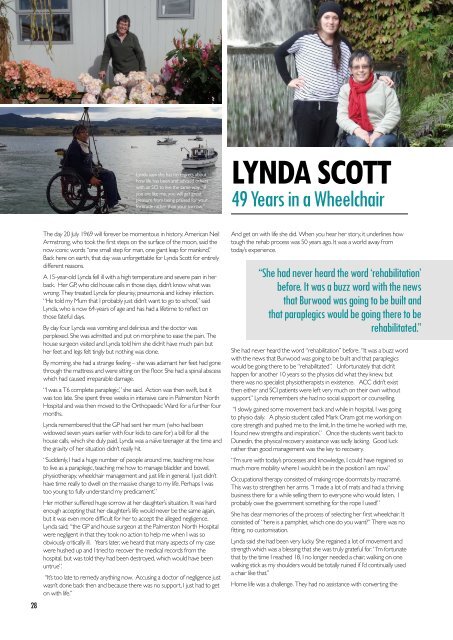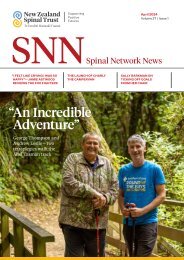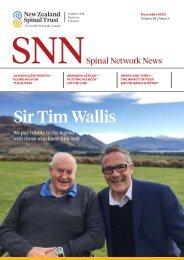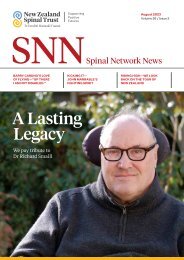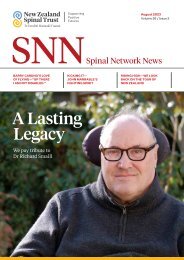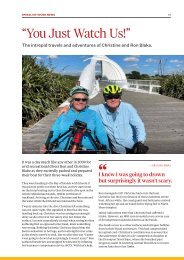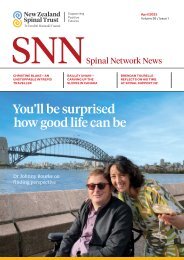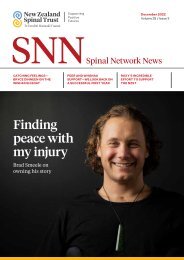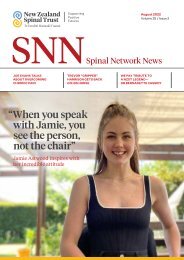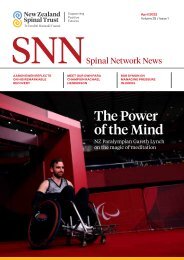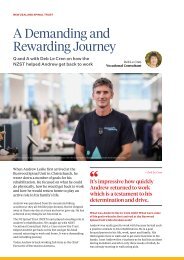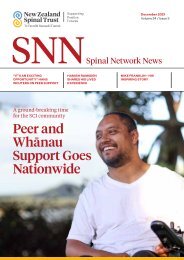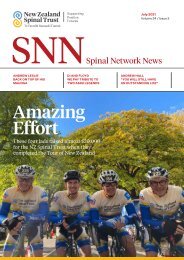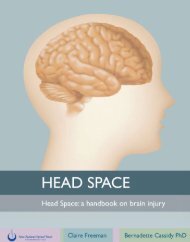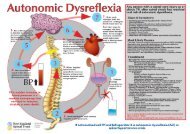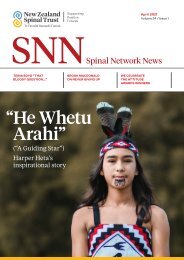SNN July 2018
A.J. Poua personal trainer in a wheelchair Attitude employee award BNZ Crusaders visit NZSCIR registry Welcome backpack Wheelie Good Tips Bayfair Festival of Disability Sports Bailey Unahi Outward Bound Jazz on fitness Lynda Scott 49 yrs in a chair
A.J. Poua personal trainer in a wheelchair
Attitude employee award
BNZ Crusaders visit
NZSCIR registry
Welcome backpack
Wheelie Good Tips
Bayfair Festival of Disability Sports
Bailey Unahi Outward Bound
Jazz on fitness
Lynda Scott 49 yrs in a chair
Create successful ePaper yourself
Turn your PDF publications into a flip-book with our unique Google optimized e-Paper software.
Lynda says she has no regrets about<br />
how life has been and advised others<br />
with an SCI to live the same way. “If<br />
you are like me, you will get great<br />
pleasure from being praised for your<br />
fortitude rather than your sorrow.”<br />
LYNDA SCOTT<br />
49 Years in a Wheelchair<br />
28<br />
The day 20 <strong>July</strong> 1969 will forever be momentous in history. American Neil<br />
Armstrong, who took the first steps on the surface of the moon, said the<br />
now iconic words “one small step for man, one giant leap for mankind.”<br />
Back here on earth, that day was unforgettable for Lynda Scott for entirely<br />
different reasons.<br />
A 15-year-old Lynda fell ill with a high temperature and severe pain in her<br />
back. Her GP, who did house calls in those days, didn’t know what was<br />
wrong. They treated Lynda for pleurisy, pneumonia and kidney infection.<br />
“He told my Mum that I probably just didn’t want to go to school,” said<br />
Lynda, who is now 64-years of age and has had a lifetime to reflect on<br />
those fateful days.<br />
By day four Lynda was vomiting and delirious and the doctor was<br />
perplexed. She was admitted and put on morphine to ease the pain. The<br />
house surgeon visited and Lynda told him she didn’t have much pain but<br />
her feet and legs felt tingly but nothing was done.<br />
By morning, she had a strange feeling – she was adamant her feet had gone<br />
through the mattress and were sitting on the floor. She had a spinal abscess<br />
which had caused irreparable damage.<br />
“I was a T6 complete paraplegic,” she said. Action was then swift, but it<br />
was too late. She spent three weeks in intensive care in Palmerston North<br />
Hospital and was then moved to the Orthopaedic Ward for a further four<br />
months.<br />
Lynda remembered that the GP had sent her mum (who had been<br />
widowed seven years earlier with four kids to care for) a bill for all the<br />
house calls, which she duly paid. Lynda was a naïve teenager at the time and<br />
the gravity of her situation didn’t really hit.<br />
“Suddenly, I had a huge number of people around me, teaching me how<br />
to live as a paraplegic, teaching me how to manage bladder and bowel,<br />
physiotherapy, wheelchair management and just life in general. I just didn’t<br />
have time really to dwell on the massive change to my life. Perhaps I was<br />
too young to fully understand my predicament.”<br />
Her mother suffered huge sorrow at her daughter’s situation. It was hard<br />
enough accepting that her daughter’s life would never be the same again,<br />
but it was even more difficult for her to accept the alleged negligence.<br />
Lynda said; “the GP and house surgeon at the Palmerston North Hospital<br />
were negligent in that they took no action to help me when I was so<br />
obviously critically ill. Years later, we heard that many aspects of my case<br />
were hushed up and I tried to recover the medical records from the<br />
hospital, but was told they had been destroyed, which would have been<br />
untrue”.<br />
“It’s too late to remedy anything now. Accusing a doctor of negligence just<br />
wasn’t done back then and because there was no support, I just had to get<br />
on with life.”<br />
And get on with life she did. When you hear her story, it underlines how<br />
tough the rehab process was 50 years ago. It was a world away from<br />
today’s experience.<br />
“She had never heard the word ‘rehabilitation’<br />
before. It was a buzz word with the news<br />
that Burwood was going to be built and<br />
that paraplegics would be going there to be<br />
rehabilitated.”<br />
She had never heard the word “rehabilitation” before. “It was a buzz word<br />
with the news that Burwood was going to be built and that paraplegics<br />
would be going there to be “rehabilitated”. Unfortunately that didn’t<br />
happen for another 10 years so the physios did what they knew, but<br />
there was no specialist physiotherapists in existence. ACC didn’t exist<br />
then either and SCI patients were left very much on their own without<br />
support.” Lynda remembers she had no social support or counselling.<br />
“I slowly gained some movement back and while in hospital, I was going<br />
to physio daily. A physio student called Mark Oram got me working on<br />
core strength and pushed me to the limit. In the time he worked with me,<br />
I found new strengths and inspiration.” Once the students went back to<br />
Dunedin, the physical recovery assistance was sadly lacking. Good luck<br />
rather than good management was the key to recovery.<br />
“I’m sure with today’s processes and knowledge, I could have regained so<br />
much more mobility where I wouldn’t be in the position I am now.”<br />
Occupational therapy consisted of making rope doormats by macramé.<br />
This was to strengthen her arms. “I made a lot of mats and had a thriving<br />
business there for a while selling them to everyone who would listen. I<br />
probably owe the government something for the rope I used!”<br />
She has clear memories of the process of selecting her first wheelchair. It<br />
consisted of “here is a pamphlet, which one do you want?” There was no<br />
fitting, no customisation.<br />
Lynda said she had been very lucky. She regained a lot of movement and<br />
strength which was a blessing that she was truly grateful for. “I’m fortunate<br />
that by the time I reached 18, I no longer needed a chair, walking on one<br />
walking stick as my shoulders would be totally ruined if I’d continually used<br />
a chair like that.”<br />
Home life was a challenge. They had no assistance with converting the


